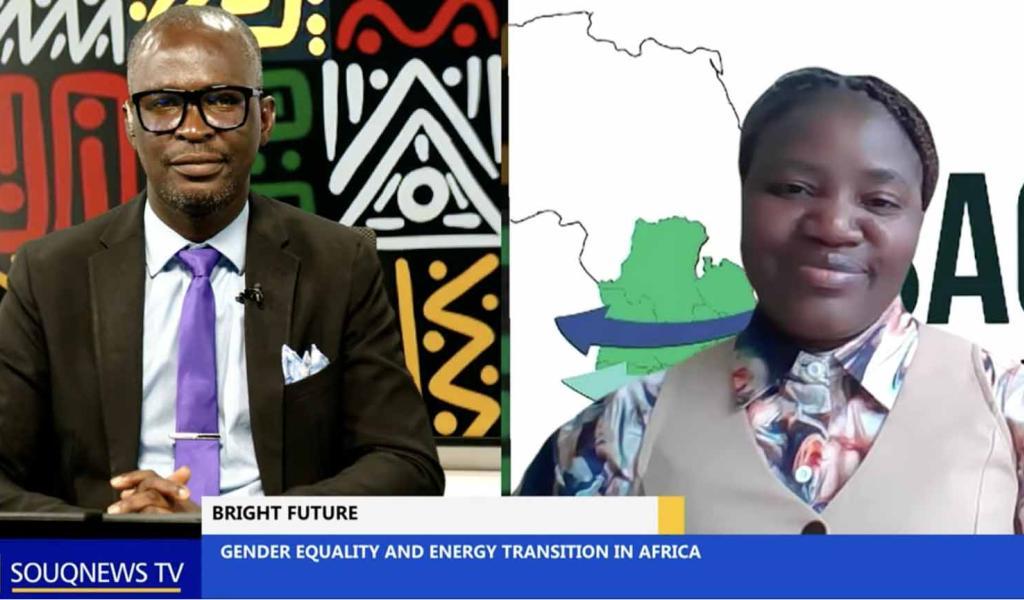In The Media
An Inclusive Energy Transition: Why Gender Matters — and Why We Must Make It Count

Driving the sustainable energy transition is not business as usual. This ambitious transformation, aimed not only at building a more inclusive system but also at reducing environmental harm and tackling climate change, requires the mobilization of every possible force. That includes the participation of underrepresented groups whose contributions are key to achieving this shared goal.
This is the message conveyed by Asteria Markus, certified Energy Policy Officer, Program Support at the EELA Project, and PhD candidate, in an interview with Just Africa, a programme of Souq News TV, a Nigerian Walsh Media company offering comprehensive coverage of global business and finance. In this discussion, Markus not only explained the role that EELA plays in promoting sustainable livelihoods across the continent but also shared her perspective on gender inclusion in the energy sector.
When it comes to gender inclusion - particularly for women, who remain underrepresented in the energy sector - the gap is striking. Studies show that women make up only 20% of the global renewables workforce, with a higher share in renewables (40%) compared to traditional energy (16%). Yet gender integration is critical: it enhances project effectiveness, accelerates policy adoption, and leads to more sustainable and equitable outcomes. Women bring diverse perspectives, strengthen decision-making processes, and foster innovation.
Despite their valuable contributions, women continue to face prejudice. "Due to traditional norms, there are beliefs that women can do certain things and cannot do others. Even in technical roles, there's disbelief that women can deliver. These perceptions need to change. Collaborative working models where women and men support each other will make it easier for women to penetrate the market," Markus emphasizes. Shifting mindsets and fostering inclusive workplace cultures, she notes, are as important as technical training in achieving lasting change.
Recognizing and empowering women as agents of change in energy access is therefore essential to designing effective, user-centered solutions. As Markus highlighted, women often make household energy decisions, making them central to shaping consumption patterns. Take the case of biomass: "Women are mainly at risk when using traditional biomass—it affects their health. They know their needs, and they face it every day," she said, underscoring the urgency of finding better alternatives.
Beyond health and household roles, Africa’s energy transition is expected to generate up to four million jobs. Ensuring women’s participation is not just a matter of equity: it is a powerful driver of economic growth and innovation. Excluding half the population from these opportunities would not only perpetuate inequality but also limit the sector’s potential for innovation and competitiveness. Gender-sensitive capacity-building is therefore crucial to help women recognize and seize opportunities. With proper training, women can excel in traditionally male-dominated technical fields, driving progress across the sector. By equipping women with technical and leadership skills, barriers can be dismantled and pathways opened for meaningful participation across the entire energy value chain.
Institutions, highlights Markus, play a substantial role in advancing the energy transition. Progress is visible: more African states are adopting gender inclusion policies, and specialized organizations such as ECREEE, EACREEE, and SACREEE are championing awareness and capacity-building efforts. However, policy alone is not enough. Strong regulatory frameworks and gender-disaggregated data are essential to monitor progress and adjust targets effectively. Implementation mechanisms, accountability measures, and sustained political commitment are all critical to translating policy promises into tangible results on the ground.
When asked about her vision for gender equity in Africa’s energy future, Markus is clear: "I want to see women recognized and genuinely applauded for their achievements. I want confident women in the sector, more role models, and men supporting collaboration, even at the household level. Breaking gender stereotypes and investing in skills development will allow women to thrive in this space."